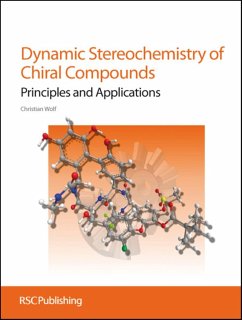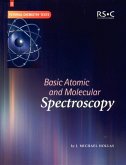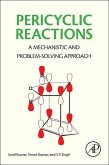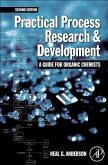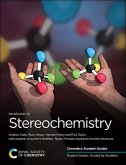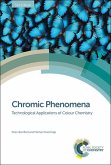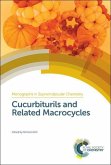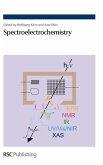Christian Wolf (USA Georgetown University)
Dynamic Stereochemistry of Chiral Compounds
Principles and Applications
Christian Wolf (USA Georgetown University)
Dynamic Stereochemistry of Chiral Compounds
Principles and Applications
- Gebundenes Buch
- Merkliste
- Auf die Merkliste
- Bewerten Bewerten
- Teilen
- Produkt teilen
- Produkterinnerung
- Produkterinnerung
A comprehensive overview of fundamental concepts of asymmetric synthesis along with in-depth discussion. Recent developments that address important synthetic challenges are presented and highlighted with hundreds of examples. Principles of Asymmetric Synthesis Asymmetric Synthesis with Stereodynamic Compounds Asymmetric Resolution and Transformation of Chiral Compounds under Thermodynamic and Kinetic Control From Chiral Propellers to Unidirectional Motors Topological Isomerism and Chirality Stereochemical Definitions and Terms
Andere Kunden interessierten sich auch für
![Basic Atomic and Molecular Spectroscopy Basic Atomic and Molecular Spectroscopy]() J. Michael HollasBasic Atomic and Molecular Spectroscopy23,99 €
J. Michael HollasBasic Atomic and Molecular Spectroscopy23,99 €![Pericyclic Reactions Pericyclic Reactions]() Sunil KumarPericyclic Reactions63,99 €
Sunil KumarPericyclic Reactions63,99 €![Practical Process Research and Development - A Guide for Organic Chemists Practical Process Research and Development - A Guide for Organic Chemists]() Neal G. AndersonPractical Process Research and Development - A Guide for Organic Chemists73,99 €
Neal G. AndersonPractical Process Research and Development - A Guide for Organic Chemists73,99 €![Introduction to Stereochemistry Introduction to Stereochemistry]() Andrew Clark (UK University of Warwick)Introduction to Stereochemistry29,99 €
Andrew Clark (UK University of Warwick)Introduction to Stereochemistry29,99 €![Chromic Phenomena Chromic Phenomena]() Peter BamfieldChromic Phenomena277,99 €
Peter BamfieldChromic Phenomena277,99 €![Cucurbiturils and Related Macrocycles Cucurbiturils and Related Macrocycles]() Cucurbiturils and Related Macrocycles251,99 €
Cucurbiturils and Related Macrocycles251,99 €![Spectroelectrochemistry Spectroelectrochemistry]() Spectroelectrochemistry141,99 €
Spectroelectrochemistry141,99 €-
-
-
A comprehensive overview of fundamental concepts of asymmetric synthesis along with in-depth discussion. Recent developments that address important synthetic challenges are presented and highlighted with hundreds of examples. Principles of Asymmetric Synthesis Asymmetric Synthesis with Stereodynamic Compounds Asymmetric Resolution and Transformation of Chiral Compounds under Thermodynamic and Kinetic Control From Chiral Propellers to Unidirectional Motors Topological Isomerism and Chirality Stereochemical Definitions and Terms
Produktdetails
- Produktdetails
- Verlag: Royal Society of Chemistry
- Seitenzahl: 532
- Erscheinungstermin: 14. Dezember 2007
- Englisch
- Abmessung: 259mm x 208mm x 33mm
- Gewicht: 1376g
- ISBN-13: 9780854042463
- ISBN-10: 0854042466
- Artikelnr.: 25543534
- Verlag: Royal Society of Chemistry
- Seitenzahl: 532
- Erscheinungstermin: 14. Dezember 2007
- Englisch
- Abmessung: 259mm x 208mm x 33mm
- Gewicht: 1376g
- ISBN-13: 9780854042463
- ISBN-10: 0854042466
- Artikelnr.: 25543534
Professor Christian Wolf graduated from the University of Hamburg, Germany in 1993 where he received his Ph.D. in 1995 under the auspices of Professor Wilfried A. K÷nig. After working as a postdoctoral Feodor-Lynen Fellow with Professor William H. Pirkle at the University of Illinois in Urbana, Illinois he took an R&D position at SmithKline Beecham Pharmaceuticals, King of Prussia, Pennsylvania in 1997. In 2000, he accepted a position as Assistant Professor in the Chemistry Department at Georgetown University in Washington, DC where he was promoted to Associate Professor with tenure in 2006. He has been a visiting scholar at the University of Reading, England in 1991 and at the University of Aix-Marseille, France in 1995. Professor Wolf's research interests comprise stereodynamics of chiral compounds, asymmetric synthesis, stereoselective sensing, chiral recognition, transition metal-catalyzed cross-coupling reactions, development of antimalarial drugs, and chiral chromatography.
CHAPTER 1: Introduction: CHAPTER 2: Principles of Chirality and Dynamic Stereochemistry
2.1. Stereochemistry of chiral compounds
2.2. Dynamic stereochemistry of cyclic and acyclic chiral compounds
CHAPTER 3: Racemization, Enantiomerization and Diastereomerization
3.1. Classification of isomerization reactions of chiral compounds
3.1.1. Racemization
3.1.2. Enantiomerization
3.1.3. Diastereomerization
3.1.4. Epimerization and mutarotation
3.2. Stereomutations of chiral compounds: Mechanisms and energy barriers
3.2.1. Alkanes
3.2.2. Alkenes and annulenes
3.2.3. Allenes and cumulenes
3.2.4. Helicenes and phenanthrenes
3.2.5. Alkyl halides, nitriles and nitro compounds
3.2.6. Amines
3.2.7. Aldehydes, ketones and imines
3.2.8. Alcohols, ethers, acetals, and ketals
3.2.9. Carboxylic acids and derivatives
3.2.10. Amino acids
3.2.11. Silicon, phosphorus and sulfur compounds
3.2.12. Organometallic compounds
3.2.13. Supramolecular structures
3.3. Atropisomerization
3.3.1. Biaryls, triaryls and diarylacetylenes
3.3.2. Nonbiaryl atropisomers
3.3.3. Cyclophanes
3.3.4. Atropisomeric xenobiotics
3.4. Pharmacological and pharmacokinetic significance of racemization
CHAPTER 4: Analytical Methods
4.1. Chiroptical methods
4.2. Variable-temperature NMR spectroscopy and proton/deuterium exchange measurements
4.3. Dynamic chromatography
4.3.1. Dynamic high performance liquid chromatography
4.3.2. Dynamic gas chromatography
4.3.3. Dynamic supercritical fluid chromatography and electrokinetic chromatography
4.4. Chromatographic and electrophoretic stopped-flow analysis
4.5. Comparison of analytical methods
CHAPTER 5: Principles of Asymmetric Synthesis
5.1. Classification of asymmetric reactions
5.2. Kinetic and thermodynamic control
5.3. Asymmetric induction
5.3.1. Control of molecular orientation and conformation
5.3.2. Single and double stereodifferentiation
CHAPTER 6: Asymmetric Synthesis with Stereodynamic Compounds: Introduction, Conversion and Transfer of Chirality
6.1. Asymmetric synthesis with chiral organolithium reagents
6.1.1. -Alkoxy- and -amino-substituted organolithium compounds
6.1.2. Sulfur-, phosphorus- and halogen-stabilized organolithium compounds
6.2. Atroposelective synthesis of axially chiral biaryls
6.2.1. Intramolecular atroposelective biaryl synthesis
6.2.2. Intermolecular atroposelective biaryl synthesis
6.2.3. Atroposelective ring construction
6.2.4. Desymmetrization of conformationally stable prochiral biaryls
6.2.5. Asymmetric transformation of stereodynamic biaryls
6.3. Nonbiaryl atropisomers
6.4. Chirality transfer and interconversion of chiral elements
6.4.1. Chirality transfer in SN2' and SE2' reactions
6.4.2. Rearrangements
6.4.2.1. 1,2-Chirality transfer
6.4.2.2. 1,3-Chirality transfer
6.4.2.3. 1,4-Chirality transfer
6.4.2.4. 1,5-Chirality transfer
6.4.3. Intermolecular chirality transfer
6.4.4. Transfer of stereogenicity between carbon and heteroatoms
6.4.5. Conversion of central chirality to other chiral elements
6.4.6. Conversion of axial chirality to other chiral elements
6.4.7. Conversion of planar chirality to other chiral elements
6.5. Self-regeneration of stereogenicity and chiral relays
6.5.1. Stereocontrolled substitution at a chiral center
6.5.2. Self-regeneration of stereocenters
6.5.3. Self-regeneration of chiral elements with stereolabile intermediates
6.5.4. Chiral relays
6.6. Asymmetric catalysis with stereolabile ligands
6.6.1. Stereodynamic achiral ligands
6.6.2. Stereolabile axially chiral ligands
6.7. Stereoselective synthesis in the solid state
CHAPTER 7: Asymmetric Resolution and Transformation of Chiral Compounds under Thermodynamic and Kinetic Control
7.1. Scope and principles of asymmetric resolution and transformation
7.2. Asymmetric transformation of the first kind
7.3. Asymmetric transformation of the second kind
7.3.1. Crystallization-induced asymmetric transformation
7.3.2. Asymmetric transformation based on chromatographic separation
7.4. Kinetic resolution and dynamic kinetic resolution
7.4.1. Kinetic resolution
7.4.1.1. Enzyme-catalyzed kinetic resolution
7.4.1.2. Nonenzymatic kinetic resolution
7.4.1.3. Parallel kinetic resolution
7.4.2. Dynamic kinetic resolution
7.4.2.1. Enzyme-catalyzed dynamic kinetic resolution
7.4.2.2. Nonenzymatic dynamic kinetic resolution
7.5. Dynamic kinetic asymmetric transformation
7.6. Dynamic thermodynamic resolution
CHAPTER 8: From Chiral Propellers to Unidirectional Motors
8.1. Stability and reactivity of stereodynamic gears
8.2. Structure and ring flipping of molecular propellers
8.3. Dynamic gearing in biaryl-, triaryl- and tetraaryl propellers
8.4. Molecular bevel gears
8.5. Vinyl propellers
8.6. Propeller-like coordination complexes with helicity control
8.7. Static gearing and cyclostereoisomerism
8.8. Molecular brakes, turnstiles and scissors
8.9. Chiral molecular switches
8.10. Stereodynamic sensors
8.11. Chiral molecular motors
CHAPTER 9: Topological Isomerism and Chirality
9.1. Synthesis of catenanes and rotaxanes
9.1.1. Statistical methods
9.1.2. Template-assisted assembly
9.1.3. Topological isomerization
9.2. Chiral catenanes
9.3. Chiral rotaxanes
9.4. Knots and Borromean rings
9.5. Topological isomerism of shuttles, switches, sensors, and rotors
GLOSSARY: Stereochemical Definitions and Terms
2.1. Stereochemistry of chiral compounds
2.2. Dynamic stereochemistry of cyclic and acyclic chiral compounds
CHAPTER 3: Racemization, Enantiomerization and Diastereomerization
3.1. Classification of isomerization reactions of chiral compounds
3.1.1. Racemization
3.1.2. Enantiomerization
3.1.3. Diastereomerization
3.1.4. Epimerization and mutarotation
3.2. Stereomutations of chiral compounds: Mechanisms and energy barriers
3.2.1. Alkanes
3.2.2. Alkenes and annulenes
3.2.3. Allenes and cumulenes
3.2.4. Helicenes and phenanthrenes
3.2.5. Alkyl halides, nitriles and nitro compounds
3.2.6. Amines
3.2.7. Aldehydes, ketones and imines
3.2.8. Alcohols, ethers, acetals, and ketals
3.2.9. Carboxylic acids and derivatives
3.2.10. Amino acids
3.2.11. Silicon, phosphorus and sulfur compounds
3.2.12. Organometallic compounds
3.2.13. Supramolecular structures
3.3. Atropisomerization
3.3.1. Biaryls, triaryls and diarylacetylenes
3.3.2. Nonbiaryl atropisomers
3.3.3. Cyclophanes
3.3.4. Atropisomeric xenobiotics
3.4. Pharmacological and pharmacokinetic significance of racemization
CHAPTER 4: Analytical Methods
4.1. Chiroptical methods
4.2. Variable-temperature NMR spectroscopy and proton/deuterium exchange measurements
4.3. Dynamic chromatography
4.3.1. Dynamic high performance liquid chromatography
4.3.2. Dynamic gas chromatography
4.3.3. Dynamic supercritical fluid chromatography and electrokinetic chromatography
4.4. Chromatographic and electrophoretic stopped-flow analysis
4.5. Comparison of analytical methods
CHAPTER 5: Principles of Asymmetric Synthesis
5.1. Classification of asymmetric reactions
5.2. Kinetic and thermodynamic control
5.3. Asymmetric induction
5.3.1. Control of molecular orientation and conformation
5.3.2. Single and double stereodifferentiation
CHAPTER 6: Asymmetric Synthesis with Stereodynamic Compounds: Introduction, Conversion and Transfer of Chirality
6.1. Asymmetric synthesis with chiral organolithium reagents
6.1.1. -Alkoxy- and -amino-substituted organolithium compounds
6.1.2. Sulfur-, phosphorus- and halogen-stabilized organolithium compounds
6.2. Atroposelective synthesis of axially chiral biaryls
6.2.1. Intramolecular atroposelective biaryl synthesis
6.2.2. Intermolecular atroposelective biaryl synthesis
6.2.3. Atroposelective ring construction
6.2.4. Desymmetrization of conformationally stable prochiral biaryls
6.2.5. Asymmetric transformation of stereodynamic biaryls
6.3. Nonbiaryl atropisomers
6.4. Chirality transfer and interconversion of chiral elements
6.4.1. Chirality transfer in SN2' and SE2' reactions
6.4.2. Rearrangements
6.4.2.1. 1,2-Chirality transfer
6.4.2.2. 1,3-Chirality transfer
6.4.2.3. 1,4-Chirality transfer
6.4.2.4. 1,5-Chirality transfer
6.4.3. Intermolecular chirality transfer
6.4.4. Transfer of stereogenicity between carbon and heteroatoms
6.4.5. Conversion of central chirality to other chiral elements
6.4.6. Conversion of axial chirality to other chiral elements
6.4.7. Conversion of planar chirality to other chiral elements
6.5. Self-regeneration of stereogenicity and chiral relays
6.5.1. Stereocontrolled substitution at a chiral center
6.5.2. Self-regeneration of stereocenters
6.5.3. Self-regeneration of chiral elements with stereolabile intermediates
6.5.4. Chiral relays
6.6. Asymmetric catalysis with stereolabile ligands
6.6.1. Stereodynamic achiral ligands
6.6.2. Stereolabile axially chiral ligands
6.7. Stereoselective synthesis in the solid state
CHAPTER 7: Asymmetric Resolution and Transformation of Chiral Compounds under Thermodynamic and Kinetic Control
7.1. Scope and principles of asymmetric resolution and transformation
7.2. Asymmetric transformation of the first kind
7.3. Asymmetric transformation of the second kind
7.3.1. Crystallization-induced asymmetric transformation
7.3.2. Asymmetric transformation based on chromatographic separation
7.4. Kinetic resolution and dynamic kinetic resolution
7.4.1. Kinetic resolution
7.4.1.1. Enzyme-catalyzed kinetic resolution
7.4.1.2. Nonenzymatic kinetic resolution
7.4.1.3. Parallel kinetic resolution
7.4.2. Dynamic kinetic resolution
7.4.2.1. Enzyme-catalyzed dynamic kinetic resolution
7.4.2.2. Nonenzymatic dynamic kinetic resolution
7.5. Dynamic kinetic asymmetric transformation
7.6. Dynamic thermodynamic resolution
CHAPTER 8: From Chiral Propellers to Unidirectional Motors
8.1. Stability and reactivity of stereodynamic gears
8.2. Structure and ring flipping of molecular propellers
8.3. Dynamic gearing in biaryl-, triaryl- and tetraaryl propellers
8.4. Molecular bevel gears
8.5. Vinyl propellers
8.6. Propeller-like coordination complexes with helicity control
8.7. Static gearing and cyclostereoisomerism
8.8. Molecular brakes, turnstiles and scissors
8.9. Chiral molecular switches
8.10. Stereodynamic sensors
8.11. Chiral molecular motors
CHAPTER 9: Topological Isomerism and Chirality
9.1. Synthesis of catenanes and rotaxanes
9.1.1. Statistical methods
9.1.2. Template-assisted assembly
9.1.3. Topological isomerization
9.2. Chiral catenanes
9.3. Chiral rotaxanes
9.4. Knots and Borromean rings
9.5. Topological isomerism of shuttles, switches, sensors, and rotors
GLOSSARY: Stereochemical Definitions and Terms
CHAPTER 1: Introduction: CHAPTER 2: Principles of Chirality and Dynamic Stereochemistry
2.1. Stereochemistry of chiral compounds
2.2. Dynamic stereochemistry of cyclic and acyclic chiral compounds
CHAPTER 3: Racemization, Enantiomerization and Diastereomerization
3.1. Classification of isomerization reactions of chiral compounds
3.1.1. Racemization
3.1.2. Enantiomerization
3.1.3. Diastereomerization
3.1.4. Epimerization and mutarotation
3.2. Stereomutations of chiral compounds: Mechanisms and energy barriers
3.2.1. Alkanes
3.2.2. Alkenes and annulenes
3.2.3. Allenes and cumulenes
3.2.4. Helicenes and phenanthrenes
3.2.5. Alkyl halides, nitriles and nitro compounds
3.2.6. Amines
3.2.7. Aldehydes, ketones and imines
3.2.8. Alcohols, ethers, acetals, and ketals
3.2.9. Carboxylic acids and derivatives
3.2.10. Amino acids
3.2.11. Silicon, phosphorus and sulfur compounds
3.2.12. Organometallic compounds
3.2.13. Supramolecular structures
3.3. Atropisomerization
3.3.1. Biaryls, triaryls and diarylacetylenes
3.3.2. Nonbiaryl atropisomers
3.3.3. Cyclophanes
3.3.4. Atropisomeric xenobiotics
3.4. Pharmacological and pharmacokinetic significance of racemization
CHAPTER 4: Analytical Methods
4.1. Chiroptical methods
4.2. Variable-temperature NMR spectroscopy and proton/deuterium exchange measurements
4.3. Dynamic chromatography
4.3.1. Dynamic high performance liquid chromatography
4.3.2. Dynamic gas chromatography
4.3.3. Dynamic supercritical fluid chromatography and electrokinetic chromatography
4.4. Chromatographic and electrophoretic stopped-flow analysis
4.5. Comparison of analytical methods
CHAPTER 5: Principles of Asymmetric Synthesis
5.1. Classification of asymmetric reactions
5.2. Kinetic and thermodynamic control
5.3. Asymmetric induction
5.3.1. Control of molecular orientation and conformation
5.3.2. Single and double stereodifferentiation
CHAPTER 6: Asymmetric Synthesis with Stereodynamic Compounds: Introduction, Conversion and Transfer of Chirality
6.1. Asymmetric synthesis with chiral organolithium reagents
6.1.1. -Alkoxy- and -amino-substituted organolithium compounds
6.1.2. Sulfur-, phosphorus- and halogen-stabilized organolithium compounds
6.2. Atroposelective synthesis of axially chiral biaryls
6.2.1. Intramolecular atroposelective biaryl synthesis
6.2.2. Intermolecular atroposelective biaryl synthesis
6.2.3. Atroposelective ring construction
6.2.4. Desymmetrization of conformationally stable prochiral biaryls
6.2.5. Asymmetric transformation of stereodynamic biaryls
6.3. Nonbiaryl atropisomers
6.4. Chirality transfer and interconversion of chiral elements
6.4.1. Chirality transfer in SN2' and SE2' reactions
6.4.2. Rearrangements
6.4.2.1. 1,2-Chirality transfer
6.4.2.2. 1,3-Chirality transfer
6.4.2.3. 1,4-Chirality transfer
6.4.2.4. 1,5-Chirality transfer
6.4.3. Intermolecular chirality transfer
6.4.4. Transfer of stereogenicity between carbon and heteroatoms
6.4.5. Conversion of central chirality to other chiral elements
6.4.6. Conversion of axial chirality to other chiral elements
6.4.7. Conversion of planar chirality to other chiral elements
6.5. Self-regeneration of stereogenicity and chiral relays
6.5.1. Stereocontrolled substitution at a chiral center
6.5.2. Self-regeneration of stereocenters
6.5.3. Self-regeneration of chiral elements with stereolabile intermediates
6.5.4. Chiral relays
6.6. Asymmetric catalysis with stereolabile ligands
6.6.1. Stereodynamic achiral ligands
6.6.2. Stereolabile axially chiral ligands
6.7. Stereoselective synthesis in the solid state
CHAPTER 7: Asymmetric Resolution and Transformation of Chiral Compounds under Thermodynamic and Kinetic Control
7.1. Scope and principles of asymmetric resolution and transformation
7.2. Asymmetric transformation of the first kind
7.3. Asymmetric transformation of the second kind
7.3.1. Crystallization-induced asymmetric transformation
7.3.2. Asymmetric transformation based on chromatographic separation
7.4. Kinetic resolution and dynamic kinetic resolution
7.4.1. Kinetic resolution
7.4.1.1. Enzyme-catalyzed kinetic resolution
7.4.1.2. Nonenzymatic kinetic resolution
7.4.1.3. Parallel kinetic resolution
7.4.2. Dynamic kinetic resolution
7.4.2.1. Enzyme-catalyzed dynamic kinetic resolution
7.4.2.2. Nonenzymatic dynamic kinetic resolution
7.5. Dynamic kinetic asymmetric transformation
7.6. Dynamic thermodynamic resolution
CHAPTER 8: From Chiral Propellers to Unidirectional Motors
8.1. Stability and reactivity of stereodynamic gears
8.2. Structure and ring flipping of molecular propellers
8.3. Dynamic gearing in biaryl-, triaryl- and tetraaryl propellers
8.4. Molecular bevel gears
8.5. Vinyl propellers
8.6. Propeller-like coordination complexes with helicity control
8.7. Static gearing and cyclostereoisomerism
8.8. Molecular brakes, turnstiles and scissors
8.9. Chiral molecular switches
8.10. Stereodynamic sensors
8.11. Chiral molecular motors
CHAPTER 9: Topological Isomerism and Chirality
9.1. Synthesis of catenanes and rotaxanes
9.1.1. Statistical methods
9.1.2. Template-assisted assembly
9.1.3. Topological isomerization
9.2. Chiral catenanes
9.3. Chiral rotaxanes
9.4. Knots and Borromean rings
9.5. Topological isomerism of shuttles, switches, sensors, and rotors
GLOSSARY: Stereochemical Definitions and Terms
2.1. Stereochemistry of chiral compounds
2.2. Dynamic stereochemistry of cyclic and acyclic chiral compounds
CHAPTER 3: Racemization, Enantiomerization and Diastereomerization
3.1. Classification of isomerization reactions of chiral compounds
3.1.1. Racemization
3.1.2. Enantiomerization
3.1.3. Diastereomerization
3.1.4. Epimerization and mutarotation
3.2. Stereomutations of chiral compounds: Mechanisms and energy barriers
3.2.1. Alkanes
3.2.2. Alkenes and annulenes
3.2.3. Allenes and cumulenes
3.2.4. Helicenes and phenanthrenes
3.2.5. Alkyl halides, nitriles and nitro compounds
3.2.6. Amines
3.2.7. Aldehydes, ketones and imines
3.2.8. Alcohols, ethers, acetals, and ketals
3.2.9. Carboxylic acids and derivatives
3.2.10. Amino acids
3.2.11. Silicon, phosphorus and sulfur compounds
3.2.12. Organometallic compounds
3.2.13. Supramolecular structures
3.3. Atropisomerization
3.3.1. Biaryls, triaryls and diarylacetylenes
3.3.2. Nonbiaryl atropisomers
3.3.3. Cyclophanes
3.3.4. Atropisomeric xenobiotics
3.4. Pharmacological and pharmacokinetic significance of racemization
CHAPTER 4: Analytical Methods
4.1. Chiroptical methods
4.2. Variable-temperature NMR spectroscopy and proton/deuterium exchange measurements
4.3. Dynamic chromatography
4.3.1. Dynamic high performance liquid chromatography
4.3.2. Dynamic gas chromatography
4.3.3. Dynamic supercritical fluid chromatography and electrokinetic chromatography
4.4. Chromatographic and electrophoretic stopped-flow analysis
4.5. Comparison of analytical methods
CHAPTER 5: Principles of Asymmetric Synthesis
5.1. Classification of asymmetric reactions
5.2. Kinetic and thermodynamic control
5.3. Asymmetric induction
5.3.1. Control of molecular orientation and conformation
5.3.2. Single and double stereodifferentiation
CHAPTER 6: Asymmetric Synthesis with Stereodynamic Compounds: Introduction, Conversion and Transfer of Chirality
6.1. Asymmetric synthesis with chiral organolithium reagents
6.1.1. -Alkoxy- and -amino-substituted organolithium compounds
6.1.2. Sulfur-, phosphorus- and halogen-stabilized organolithium compounds
6.2. Atroposelective synthesis of axially chiral biaryls
6.2.1. Intramolecular atroposelective biaryl synthesis
6.2.2. Intermolecular atroposelective biaryl synthesis
6.2.3. Atroposelective ring construction
6.2.4. Desymmetrization of conformationally stable prochiral biaryls
6.2.5. Asymmetric transformation of stereodynamic biaryls
6.3. Nonbiaryl atropisomers
6.4. Chirality transfer and interconversion of chiral elements
6.4.1. Chirality transfer in SN2' and SE2' reactions
6.4.2. Rearrangements
6.4.2.1. 1,2-Chirality transfer
6.4.2.2. 1,3-Chirality transfer
6.4.2.3. 1,4-Chirality transfer
6.4.2.4. 1,5-Chirality transfer
6.4.3. Intermolecular chirality transfer
6.4.4. Transfer of stereogenicity between carbon and heteroatoms
6.4.5. Conversion of central chirality to other chiral elements
6.4.6. Conversion of axial chirality to other chiral elements
6.4.7. Conversion of planar chirality to other chiral elements
6.5. Self-regeneration of stereogenicity and chiral relays
6.5.1. Stereocontrolled substitution at a chiral center
6.5.2. Self-regeneration of stereocenters
6.5.3. Self-regeneration of chiral elements with stereolabile intermediates
6.5.4. Chiral relays
6.6. Asymmetric catalysis with stereolabile ligands
6.6.1. Stereodynamic achiral ligands
6.6.2. Stereolabile axially chiral ligands
6.7. Stereoselective synthesis in the solid state
CHAPTER 7: Asymmetric Resolution and Transformation of Chiral Compounds under Thermodynamic and Kinetic Control
7.1. Scope and principles of asymmetric resolution and transformation
7.2. Asymmetric transformation of the first kind
7.3. Asymmetric transformation of the second kind
7.3.1. Crystallization-induced asymmetric transformation
7.3.2. Asymmetric transformation based on chromatographic separation
7.4. Kinetic resolution and dynamic kinetic resolution
7.4.1. Kinetic resolution
7.4.1.1. Enzyme-catalyzed kinetic resolution
7.4.1.2. Nonenzymatic kinetic resolution
7.4.1.3. Parallel kinetic resolution
7.4.2. Dynamic kinetic resolution
7.4.2.1. Enzyme-catalyzed dynamic kinetic resolution
7.4.2.2. Nonenzymatic dynamic kinetic resolution
7.5. Dynamic kinetic asymmetric transformation
7.6. Dynamic thermodynamic resolution
CHAPTER 8: From Chiral Propellers to Unidirectional Motors
8.1. Stability and reactivity of stereodynamic gears
8.2. Structure and ring flipping of molecular propellers
8.3. Dynamic gearing in biaryl-, triaryl- and tetraaryl propellers
8.4. Molecular bevel gears
8.5. Vinyl propellers
8.6. Propeller-like coordination complexes with helicity control
8.7. Static gearing and cyclostereoisomerism
8.8. Molecular brakes, turnstiles and scissors
8.9. Chiral molecular switches
8.10. Stereodynamic sensors
8.11. Chiral molecular motors
CHAPTER 9: Topological Isomerism and Chirality
9.1. Synthesis of catenanes and rotaxanes
9.1.1. Statistical methods
9.1.2. Template-assisted assembly
9.1.3. Topological isomerization
9.2. Chiral catenanes
9.3. Chiral rotaxanes
9.4. Knots and Borromean rings
9.5. Topological isomerism of shuttles, switches, sensors, and rotors
GLOSSARY: Stereochemical Definitions and Terms

